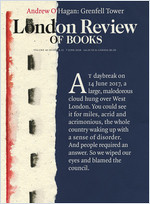I subscribed to the London Review of Books for the book reviews. I liked that they were longer than the couple of paragraphs usually allotted to a book review, and that they often placed the book in the context of the author’s oeuvre. Sometimes the long-form reviews told too much of the story, but that wasn’t a deterrence if I was truly interested in the book. I also became adept at skipping over those parts.
Over the couple of decades I’ve been reading the LRB, I’ve been a little dismayed at the increasing number of political essays they’ve been including. Sometimes I skip over them, but others have been useful in delivering in-depth portraits and histories of what is going on in the rest of the world, sadly neglected these days in U.S. news sources.
Still, I was surprised to find that an entire issue (Volume 40, Number 11, 7 June 2018) was devoted to Andrew O’Hagan’s piece on the Grenfell Tower fire.
I’d heard of the fire, of course. Managed by the local council, London’s Grenfell Tower provided high-rise low-income housing. On 14 June 2017, safety measures intended to isolate fire failed, and a fire in one apartment quickly spread through the 24-story tower. Firefighters were unable to contain the blaze, and 72 people died.
Accusations came thick and fast. Most people blamed the council, saying that they only cared about the predominantly wealthy neighborhood and not the poorer people, especially those in the tower. Some residents had been complaining for years about various problems and, as a result, the council had conducted a major renovation, completed the previous year, 2016, that among other things installed new windows and a new composite cladding on the exterior of the building.
In England, local councils provide some of the functions of local government. Elected councilors are responsible for overseeing things like education, libraries, social services, waste collection, and housing; but hire contractors to actually perform the work.
O’Hagan’s piece, researched intensively for a year, tells the story of some of the people who lived there. With six flats on 23 of the floors, you would think people would be strangers to each other, but as resident Alison Moses says, “‘It’s a funny little community . . . Everybody knows everybody, at least by sight.’” It was also a remarkably multicultural community. O’Hagan says, “There was scarcely any floor on which more than two families were born in the same country.”
I found the individual stories which make up the bulk of the article fascinating: their backgrounds, their joy and pride in their homes in Grenfell. But what really struck me about this piece was the political fallout.
Activist groups immediately blamed the council, claiming that they had cut costs by having defective cladding installed; they hadn’t responded to tenant complaints, and they did nothing to help tenants during and after the fire. These cries were taken up by the media swarming the site and quickly became the dominant story about the fire. However, when O’Hagan interviewed these activists, they provided pages of accusations, but no actual proof.
When he interviewed council members, he found that they were on the ground immediately and in force, setting up shelters and getting people there. As one council officer said,
We were organising food, transport, data and donations, as well as accommodation. Our staff were in all day. And we had all gone home that Wednesday night exhausted and switched on the television news to learn that we hadn’t done anything.
The problem was that they hadn’t identified themselves as council, their philosophy being to just get the job done and not make a fuss about it. As a result, no one realised who they were. A senior council officer said,
The first full day after the fire, a survivor was being interviewed by somebody in the media, sitting beside one of our social workers who had been with her since she escaped The media were keen to press her about the council. “The council don’t care,” the woman said. “They’re not doing anything.”
And at the end of the interview the social worker turned and looked at her. “Why did you say that?” she asked. “I’ve been with you since the beginning.”
“Oh,” the woman said. “But you’re not from the council, are you?”
Similarly, the issue of the cladding—the culprit in the spread of the fire—was hardly the council’s fault. It is not their job to verify it met safety standards; that had been privatised to a company that “both recommends the standards and tests them in the marketplace, while also being entwined with many of the companies whose products they are testing.” The blame lies with the lack of industry regulations, the lack of independent testing, and the contractor’s omission of a fire safety inspection—it turns out the cladding had been tested “on a desktop, but never properly in situ.” Also, this cladding was already in common use, installed on many other low-income housing around the country.
The government, eager to distance themselves from the catastrophe, put the blame on the council as well. They made things worse by promising the public things that they knew the council couldn’t deliver.
I could go on, but the chilling thing for me, in this era of fake news and hollowed-out journalism, is how quickly a false story can become “the truth”, not just among the chanting crowds who ignore right-wing politicians’ lies, but among progressives as well. We need responsible journalism more than ever. And we need to attend to our social reputation, the only thing the council neglected. Your reputation is everything, as my mother used to say.
How can we best manage our reputation in this age of social media and devolved journalism?

